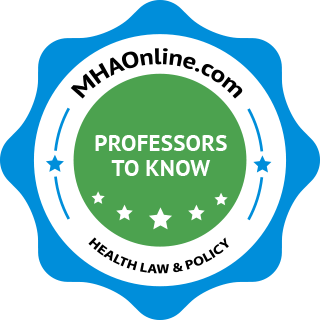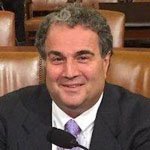Influential Healthcare Law and Policy Professors to Know

MHA Search
For the latest academic year, we have 170 schools in our MHAOnline.com database and those that advertise with us are labeled “sponsor”. When you click on a sponsoring school or program, or fill out a form to request information from a sponsoring school, we may earn a commission. View our advertising disclosure for more details.
Healthcare is one of the fastest growing industries in the world. With the rise of disease and the increasing costs of healthcare, there is a need for policymakers to intervene and ensure that all segments of society benefit from breakthroughs in healthcare and technology. Health law and policymakers are responsible for framing legislation around the cost, quality, and access to healthcare.
A master’s degree in healthcare and policy prepares students to take up leadership positions in the field. The curriculum for this type of program includes courses in mental health law, public health law, bioethics, policy analysis, environmental law, and food and drug law. Students get the chance to explore topics on obesity and injury prevention, healthcare reform, disease control, and vaccination law and policy. Many universities also offer joint degree programs with medical schools to help students enhance their knowledge of healthcare.
Three universities in particular boast outstanding healthcare law and policy programs and talented professors: Arizona State University, the University of Houston, and Cleveland State University. The following guide profiles several exceptional faculty members leading the field of healthcare law and policy.
Influential Healthcare Law and Policy Professors to Know
-
 Diana M. Bowman, PhD - Arizona State University
Diana M. Bowman, PhD - Arizona State UniversityDr. Diana Bowman is an associate dean for international engagement and associate professor at the Arizona State University Sandra Day O'Connor College of Law. She teaches nanotechnology law and policy, environmental health policy, law and public health, research and development administration within large organizations, and bioethics. She has held faculty positions at the University of Melbourne, the University of Michigan, and the University of Twente.
Dr. Bowman’s research explores the development of smarter governance and regulating innovation, improving public health, and deliberation of the ethical, societal, and legal dimensions of emerging technologies. She has published her work in top journals, such as the Bulletin of Science, Nature Nanotechnology, and Technology and Society. She is also an editorial board member of the Jurimetrics, Risk, Regulation and Policy eJournal and the Nanotechnology Law and Business Journal, as well as a member of the American Bar Association. Dr. Bowman has received numerous awards for her outstanding work, such as the John D. Thompson Prize for Young Investigators and the Andrew Carnegie Fellowship.
She earned a bachelor's of law, a bachelor's of science in physiology, and a doctorate in law from Monash University. She also has a graduate diploma in legal practice from The College of Law in Australia.
-
 Seth J. Chandler, JD - University of Houston
Seth J. Chandler, JD - University of HoustonSeth Chandler is a professor of law at the University of Houston and co-director of the school's Health Law & Policy Institute. Before joining the University of Houston, he worked at several full-service law firms such as Williams & Connolly and Munger, Tolles, & Olson. He teaches classes in contracts and health law, insurance law, and law and economics.
Professor Chandler’s research focuses on the use of mathematical methods to study insurance underwriting laws. His work has been published in the Houston Journal of Health Law & Policy and the Connecticut Insurance Law Journal. Chandler is a recipient of the Enron Teaching Excellence Award. He completed his Juris Doctor at Harvard University and bachelor's from Princeton University. -
 David Gartner, JD, PhD - Arizona State University
David Gartner, JD, PhD - Arizona State UniversityDr. David Gartner is an associate dean and professor at the Sandra Day O'Connor College of Law at Arizona State University. He teaches constitutional law, global health law and policy, and foreign relations law. Before joining ASU, he was a fellow at the Brookings Institution and a visiting scholar at Harvard University. He is currently a part of several professional organizations, including the American Association of Law Schools and American Society of International Law.
Dr. Gartner's research has appeared in the Journal of International Law and International Relations, the Arizona State Law Journal, and the Duke Journal of Comparative & International Law. His work explores the role of international institutions in shaping laws related to global health, development, education, and the environment. Dr. Gartner received his doctorate in political science from the Massachusetts Institute of Technology, his Juris Doctor from Yale Law School, and his bachelor's degree from Brown University. -
 Henry T. Greely, JD - Stanford University
Henry T. Greely, JD - Stanford UniversityHenry Greely is the distinguished Dean F. and Kate Edelman Johnson professor of law at Stanford University. He holds several other titles, including director of the Center for Law and the Biosciences, chair of the Steering Committee of the Center for Biomedical Ethics, and director of the Stanford program in neuroscience and society. He teaches relevant courses on the FDA, law and genetics, and law and neuroscience, as well as offering directed research.
Professor Greely’s research focuses on ethical, legal, and social issues arising from advances in the biosciences, especially prenatal genetic diagnosis, genome editing, neuroscience, stem cell research, and assisted reproduction. Before joining Stanford, Greely worked at Tuttle & Taylor as an assistant to the secretary of U.S. Department of Energy and as a special assistant to the general counsel of U.S. Department of Defense. He is a recipient of the Richard M. Lyman Award from Stanford University, as well as a fellow of the American Association for the Advancement of Science. Professor Greely completed his Juris Doctor at Yale Law School and bachelor's degree at Stanford University. -
 James G. Hodge, JD - Arizona State University
James G. Hodge, JD - Arizona State UniversityJames Hodge serves as director of the Center for Public Health Law and Policy at Arizona State University. He teaches public health law and ethics courses and has worked at several other institutions before joining the ASU faculty, including the Georgetown University Law Center, the Johns Hopkins Bloomberg School of Public Health, and the Johns Hopkins Berman Institute of Bioethics.
Professor Hodge’s current research explores the legal support for the use of health assessments, emergency legal and ethical preparedness, and international tobacco laws and policy. He is an editorial member of the Journal of Disaster Medicine and Public Health Preparedness and UPMC’s journal, Health Security. He received his Juris Doctor from Salmon P. Chase College of Law, his master of law from Georgetown University Law Center, and his bachelor's degree from the College of Charleston. -
 Daniel P. Kessler, JD, PhD - Stanford University
Daniel P. Kessler, JD, PhD - Stanford UniversityDr. Daniel Kessler teaches law, management, and health research and policy at Stanford University. His research interests and expertise lie in law and economics, the economics of healthcare, and antitrust law. Most recently, he has worked in hospital mergers and ownership for the quality and cost of medical care.
Dr. Kesler’s research on the effects of Medicare and designing antitrust policy has been published in several journals, such as the American Journal of Health Economics, Health Affairs, and the Journal of Competition Law and Economics. In recognition of his outstanding work, Dr. Kessler has received awards from the National Institute of Healthcare Management Foundation, Stanford, as well as the International Health Economics Association. He completed his doctorate in economics at the Massachusetts Institute of Technology and Juris Doctor at Stanford Law School. -
 Myles Lynk, JD - Arizona State University
Myles Lynk, JD - Arizona State UniversityMyles Lynk is a professor of law, a faculty fellow at the Center for Law, Science, and Innovation, and a member of Arizona State University’s academic council. He teaches courses in legal ethics and professional responsibility, corporate governance, and civil procedure. Currently, his research focuses on bioethics in healthcare and law, corporate law, and civil procedure. He has published his research in numerous journals such as Journal of Law, Medicine and Ethics and Journal of the National Medical Association. Lynk is also a part of the American Law Institute and a member of the U.S. Indian Health Services Phoenix Area Institutional Review Board. Arizona State University has awarded him several honors such as the Excellence in Diversity Award and the ASU College of Law Alumni Association’s Faculty of the Year Award. He earned his Juris Doctor from Harvard Law School and bachelor's from Harvard College.
-
 Jessica Lind Mantel, JD - University of Houston
Jessica Lind Mantel, JD - University of HoustonJessica Mantel is co-director of the Health Law and Policy Institute at the University of Houston. She teaches courses on managed care, health law financing, the U.S. health system, health regulatory process, and health transactions. Before teaching, she worked as the general counsel for the Department of Health and Human Services.
Professor Mantel’s research explores emerging trends in healthcare delivery, the allocation of healthcare resources, and the impact of regulatory schemes on healthcare. A member of the American Association of Law Schools, the American Society of Law, and the American Health Lawyers Association, Mantel has written articles for the Annals of Health Research, the Ohio Northern University Law Review, and the Michigan Law Review. She completed her Juris Doctor at the University of Michigan Law School, master's of public policy at the University of Michigan School of Public Policy, and bachelor’s at the University of Pennsylvania. -
 Michelle M. Mello, PhD - Stanford University
Michelle M. Mello, PhD - Stanford UniversityDr. Michelle Mello is a law professor at Stanford Law School. She also teaches health research and policy at Stanford University's School of Medicine. Before joining Stanford, she worked at the Harvard School of Public Health in the Department of Health Policy and Management.
Dr. Mello's research explores pharmaceuticals, ethics, medical malpractice, and health law issues. She is a member of professional organizations such as American Public Health Association, the Society for Empirical Legal Studies, and the American Society for Law. Her research has appeared in top journals such as Health Affairs, the New England Journal of Medicine, and Milbank Quarterly, where she sits on the editorial board. Dr. Mello has won several awards for her contributions to her field, including the Department of Health Policy and Management Alumni Leadership Award and the Robert Wood Johnson Foundation Investigator Award in Health Policy Research. She has a Juris Doctor from Yale Law School, a doctorate from the University of North Carolina, and a bachelor's from Stanford University. -
 Brian Edward Ray, JD - Cleveland State University
Brian Edward Ray, JD - Cleveland State UniversityBrian Edward Ray teaches civil procedure, international law, legislation and regulation, and comparative constitutional law at the Cleveland-Marshall College of Law of Cleveland State University. Professor Ray is a member of prominent organizations such as the American Bar Association, the Law and Society Association, and the American Society of International Law. He has written for the European Journal of International Law and the Stanford Journal of International Law. Among the many accolades, Ray has received the University Merit Award for Outstanding Scholarship and Service and University Faculty Scholarship Initiative Award. He earned his bachelor's from the University of Notre Dame, master's from the University of Pennsylvania, and Juris Doctor from Ohio State University.
-
 Heidi Gorovitz Robertson, JD, JSD - Cleveland State University
Heidi Gorovitz Robertson, JD, JSD - Cleveland State UniversityDr. Heidi Gorovitz Robertson is a professor of law and director of student success at Cleveland State University. She teaches courses on legislation and the regulatory state, property, environmental law and regulation, international environmental law, and legal issues surrounding the deepwater horizon oil spill. She previously worked at the University of Wisconsin–Madison, the Columbia University School of Law, and University of Wisconsin Law School.
Professor Robertson’s research explores shale oil and gas, recreational land use, hydraulic fracturing, and public access to privately-owned land. She has written for prominent journals, such as Journal of Environmental Law and Litigation, the Journal of Corporate Real Estate, and Crain’s Cleveland Business. Robertson is a member of the Cleveland Metropolitan Bar Association, the American Bar Association, and International Academic Association for Planning, Law, and Property Rights. She has received several awards such as the Wilson G. Stapleton Award for Faculty Excellence and the University Administrative Merit Recognition Award. Professor Robertson received her bachelor's degree from Tufts University, a Juris Doctor from the University of Wisconsin, and a master of law and doctorate of juridical science (JSD) from Columbia University. -
 David M. Studdert, ScD - Stanford University
David M. Studdert, ScD - Stanford UniversityDr. David Studdert is a professor of medicine and law at Stanford University School of Medicine and Stanford Law School, respectively. He teaches courses in health law, directed research, and the consequences of research gone wrong. He has also taught at Harvard School of Public Health and the University of Melbourne. Dr. Studdert's research focuses on the quality and safety of healthcare, injury prevention, bioethics, and health law and regulation, which has appeared in peer-reviewed journals such as BMC Medicine, and the Australia and New Zealand Journal of Surgery. Dr. Studdert earned the Federation Fellowship from the Australian Research Council and the Alice S. Hersh New Investigator Award. He is also an active member of the National Health Lawyers Association and the Health Services Research Association of Australian and New Zealand. Dr. Studdert earned his doctorate of science and master's of public health from Harvard’s School of Public Health. He also has a bachelor's of arts and a bachelor's of law from the University of Melbourne.
-
 Jonathan P. Witmer-Rich, JD - Cleveland State University
Jonathan P. Witmer-Rich, JD - Cleveland State UniversityJonathan P. Witmer-Rich teaches law at the Cleveland-Marshall College of Law at Cleveland State University. He leads courses on the legal responses to terrorism, criminal procedure, and criminal law. Before joining Cleveland State University, he taught law at Case Western Reserve University School of Law.
Professor Witmer-Rich's research explores criminal law theory and criminal procedure, specifically alternative consent in rape, sexual assault, and covert searches. He is a member of numerous professional organizations such as the Law & Society Association and the American Bar Association. He has published his research in the American Criminal Law Review, the Florida Law Review, and the Cleveland State Law Review. He has won awards such as Cleveland-Marshall Alumni Association Stapleton Award for Faculty Excellence and Ohio Faculty Innovator Award. He completed his Juris Doctor from the University of Michigan and his bachelor's from Goshen College.
Methodology
To select faculty for inclusion in this list of professors, MHAOnline considered the following criteria:
- University affiliation: The professor must work within a healthcare law and policy program at an accredited university in the U.S. They must also be actively teaching.
- Publication: The professors on this list have published their research extensively in peer-reviewed journals.
- Institutional and peer recognition: They have been recognized for their excellence through awards, distinguished titles, notable grants, and research funding.
- Professional commitment: They have also gone above and beyond in their leadership and professional contributions. Some have been selected to be faculty deans or program directors, while others have become leaders of professional organizations.

